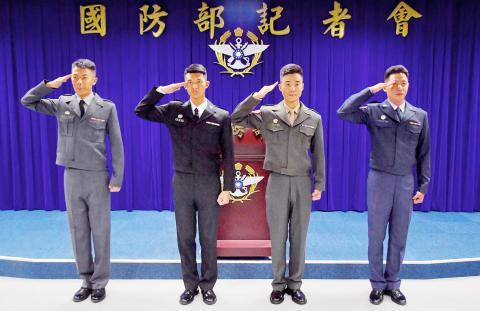Following last week’s announcement of a NT$200 million (US$6.6 million) change to military uniforms, an online petition against the policy has collected enough signatures to ask the Ministry of National Defense to make a detailed policy statement.
The ministry on Tuesday last week said a new set of short-length winter jackets would be delivered to each branch of the armed forces by the end of next year. The announcement drew mixed reactions, with critics attacking the cost.
The Taiwan Military and Law Enforcement Tactical Research and Development Association initiated an online petition against the policy on a government platform on Friday, describing the change as “unnecessary spending for a non-urgent jacket.”

Photo: CNA
The policy was made to “cater to Minister of National Defense Feng Shih-kuan’s (馮世寬) personal tastes,” and NT$200 million would be spent on a jacket that not everyone in the military would wear, so there was no urgent need for the change and it would only take money away from more important the defense budget items.
National defense requires public support, and non-sensitive defense policymaking should be made known to the public, the group said, adding that the defense budget has never reached the long-standing goal of 3 percent of GDP.
The ministry should disclose its decisionmaking process on non-confidential spending over a certain amount to allow for public oversight, the association said.
The association proposed the petition through the National Development Council’s policy discussion forum on Wednesday.
It was approved and published online two days later.
Government agencies are required to make a formal reply to any petition launched on the forum that collects 5,000 signatures in 60 days.
As of yesterday, the petition on the uniform change had collected 5,168 signatures, so the defense ministry must make a formal reply by Oct. 15.
Ministry spokesman Major General Chen Chung-chi (陳中吉) yesterday said the uniform change had been planned as part of the annual budget, and the ministry might also replace the uniforms of military students in the future.
The ministry fully respects the differing opinions and suggestions about uniform and equipment spending, Chen said.

RESOLUTIONS DEBATE: Taiwan’s allies said that UN and WHA resolutions cited by China and other nations ‘do not determine Taiwan’s participation in WHO activities’ A proposal to invite Taiwan to this year’s World Health Assembly (WHA) was rejected on Monday, resulting in Taipei’s absence from the annual meeting for a ninth consecutive year, although partners spoke up for Taiwan’s participation at the first day of the meeting. The first agenda item after the opening was a “two-on-two debate” on a proposal to invite Taiwan to participate at the WHA as an observer. Similar to previous years, two countries made statements in favor of the proposal, while two others expressed their opposition. Philippine Secretary of Health Teodoro Herbosa, president of the 78th WHA, accepted the WHA General Committee’s

Palauan President Surangel Whipps Jr arrived in Taiwan last night to kick off his first visit to the country since beginning his second term earlier this year. After arriving at Taoyuan International Airport at around 6:30 pm, Whipps and his delegation were welcomed by Minister of Foreign Affairs Lin Chia-lung (林佳龍). Speaking to gathered media, the Palauan leader said he was excited and honored to be back in Taiwan on his first state visit to Taiwan since he was sworn in this January. Among those traveling with Whipps is Minister of State Gustav N. Aitaro, Public Infrastructure

Premier Cho Jung-tai (卓榮泰) on Friday laid out the Cabinet’s updated policy agenda and recapped the government’s achievements ahead of the one-year anniversary of President William Lai’s (賴清德) inauguration. Cho said the government had made progress across a range of areas, including rebuilding Hualien, cracking down on fraud, improving pedestrian safety and promoting economic growth. “I hope the public will not have the impression that the Cabinet only asked the legislature to reconsider a bunch of legal amendments,” Cho said, calling the moves “necessary” to protect constitutional governance and the public’s interest. The Cabinet would work toward achieving its “1+7” plan, he said. The

Nvidia founder and CEO Jensen Huang (黃仁勳) hosted a dinner in Taipei last night with key Taiwanese suppliers to celebrate the successful mass production of the company’s new Blackwell AI systems. Speaking to the media earlier yesterday, Huang thanked Nvidia’s Taiwanese partners for their contributions to the company’s ecosystem, while also sharing his plans to meet with Taiwan Semiconductor Manufacturing Co (TSMC) founder Morris Chang (張忠謀). In response to rumors that Nvidia will launch a downgraded Hopper H20 chip for China in July, Huang dismissed the reports, saying, “That is not true.” He clarified that there